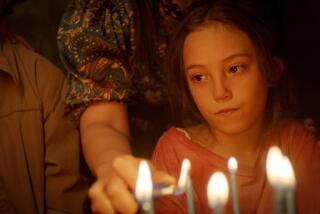Children in a time of war see an apparition of peace in ‘Fatima’
- Share via
The Los Angeles Times is committed to reviewing new theatrical film releases during theCOVID-19 pandemic. Because moviegoing carries inherent risks during this time, we remind readers to follow health and safety guidelines as outlined by the CDC and local health officials. We will continue to note the various ways readers can see each new film, including drive-in theaters in the Southland and VOD/streaming options when available.
“Fatima” chronicles mystical events leading to what believers call “the Miracle of the Sun” in October 1917, in Fátima, Portugal. The film follows three young shepherd children — principally 9-year-old Lúcia (Stephanie Gil) — who see a holy apparition on a monthly basis. Trouble ensues when word gets out.
Desperate villagers then expect their sick loved ones to be healed, or those who are soldiers to be spared (in World War I). When these miracles-on-demand aren’t granted, some turn on the kids. There’s pressure on the kids, from family, church and state, to admit they made it up.
The smiling apparition (Joana Ribeiro) makes promises: The war will end soon; a sick child “will heal if he starts believing.” It proselytizes: People must pray more; bigger wars are “what will happen if sinners do not convert.” Eventually, 70,000 come to witness the kids commune with the spirit only they see, and the “miracle” occurs.
Harvey Keitel shows up as a skeptical professor in the 1980s questioning the elderly Lúcia (Sonia Braga), but there’s no tension as to what he’ll find. In the movie, these things definitely happened. To its credit, the professor asks good questions. To its detriment, neither the film nor elder Lúcia seem to care.
Director Marco Pontecorvo was a cinematographer on HBO’s most lush and epic series, “Rome” and “Game of Thrones.” “Fatima” is prettily shot but realized with little unique expression. Emotional moments are flat. Visual effects conveying miracles are unremarkable, including in the climax. The music is what you’d expect, with a song performed by Andrea Bocelli.

A clip from “Fatima” (2020).
There are other familiar faces: Joaquim de Almeida as the local priest; Goran Visnjic as the mayor. But this isn’t an acting showcase. There are dramatic situations, sure. Visnjic’s mayor must regularly read out the names of villagers reported killed or missing in the war as families hope not to hear their loved ones mentioned. A family’s crops are unnecessarily destroyed. A daughter feels unloved by her mother. But these emotional arrows don’t find their targets. They’re played as a pageant, more described than felt. Even when we learn two young characters will die, the moment is passed over.
The notable exception is Marco d’Almeida’s performance as Lúcia’s father; he sympathetically tries to balance the needs of his family while coping with catastrophes. But the conversation between the professor and elderly Lúcia goes nowhere. It abruptly drops — an odd narrative choice, making us feel that it didn’t matter.
And in the eyes of believers, it likely doesn’t.
The film’s relevance probably depends on the viewer’s beliefs. The devout might take it as proof of divinity: A Portuguese bishop declared the visions “worthy of belief”; some involved were sainted. Skeptics might entertain other explanations for “the Miracle of the Sun.” In a pandemic, some might call the film a beacon of hope; others might prefer science to prayer for salvation. As a piece of cinema, though, “Fatima” is unlikely to be canonized.
'Fatima'
Rating: PG-13 for some strong violence and disturbing images
Running Time: 1 hour, 53 minutes
Playing: Available Aug. 28 on PVOD; and in general release where theaters are open
More to Read
Only good movies
Get the Indie Focus newsletter, Mark Olsen's weekly guide to the world of cinema.
You may occasionally receive promotional content from the Los Angeles Times.











